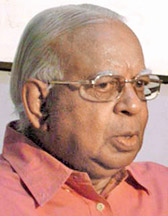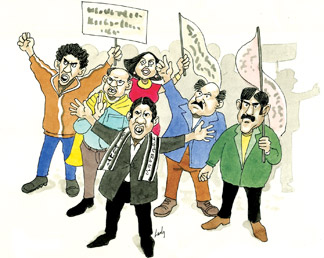|
Time for honesty in dialogue with govt.:
D oes
TNA accept Darusman & Co on LTTE? oes
TNA accept Darusman & Co on LTTE?
The countries of South Asia have many strong bonds that make this
region rich in diversity. It is the home to many great histories that
straddle the centuries, cultures that are growing in vibrancy and point
to new trends in the modern world, traditions that have drawn from the
great religions of the world, and societies seeking a better place in
the world for their people, seeking to leapfrog into age of technology
and all it offers.
As Mike Smith, Assistant Secretary-General of the United Nations and
head of the Counter-Terrorism Committee Executive Directorate (CTED)
states in the Hindu last Thursday (19), "the South Asian countries are
also united in their humanity and their quest for a peaceful life. But
terrorists defy these shared values. South Asia has unfortunately
suffered greatly over the years at the hands of terrorist groups
espousing a wide variety of ideologies, whose actions cannot be
defended."
Common challenges
|

R Sampanthan |
The problem of terrorism is the subject of an important conference
that takes place in Thimpu, Bhutan from May 24 to 26, when senior Police
officers, prosecutors and, for the first time, judges from the eight
SAARC members will discuss common challenges and strategies. They will
consider specific issues that arise in the context of terrorism-related
cases, such as interviewing suspects, interrogation techniques, the
challenges of using classified evidence in prosecutions, and the
effective implementation of laws aimed at countering terrorism and
transnational crime.
Mike Smith adds: "This workshop in Bhutan is the fourth in a series
of events organized by CTED and the Centre on Global Counterterrorism
Cooperation with the support of SAARC and host countries in South Asia.
Like its predecessors in Bangladesh, Sri Lanka and Indonesia, this
month's event will seek to identify effective approaches, specific to
the region and grounded in respect for human rights and the rule of
law."
It is significant that this forum meets soon after the Darusman
Report, that has sought to belittle Sri Lanka's achievement in defeating
terrorism and also seeks to accuse Sri Lanka of many crimes against
humanity for her success in liberating all of the country from the
bloody grip of terror. What the Economist UK once described as the 'Sri
Lankan Option' in defeating terrorism will certainly give many lessons
to the SAARC countries on dealing with this threat to development, both
economic and social.
TNA endorsement
Among the matters that have escaped much attention after publication
of the Darusman Report is the wholehearted endorsement of it by the
Tamil National Alliance (TNA) in Sri Lanka, stated very clearly by its
leader R Sampanthan.
In meetings with Indian leaders earlier this week, both sides agreed
that the end of armed conflict in Sri Lanka created a historic
opportunity to address all outstanding issues in a spirit of
understanding and mutual accommodation imbued with political vision to
work towards genuine national reconciliation. Sri Lanka's External
Affairs Minister Prof. G L Peiris clearly affirmed the Government's
commitment to ensuring expeditious and concrete progress in the ongoing
dialogue with representatives of Tamil parties. A devolution package,
building upon the 13th Amendment, would contribute towards creating the
necessary conditions for such reconciliation, he said.
Darusman Report
The outright acceptance and endorsement of the Darusman Report by the
TNA raises some questions about the commitment of the TNA, which still
claims leadership of the Tamil people, towards genuine reconciliation.
This becomes especially relevant in the context of the findings by
Darusman & Co about the LTTE, which most people who use this report to
attack the government are happy to be silent about.

Here are some of these observations about the LTTE:
l Detailing the emergence of the LTTE taking advantage of the
conducive environment for training and organizing in Tamil Nadu, it
states the "LTTE began as a Tamil liberation movement and eventually
became the most disciplined and most nationalist of the Tamil militant
groups, emerging as the dominant force espousing a separatist agenda in
the mid - 1980s. During this period the LTTE adopted increasingly
violent tactics, using violence to silence other Tamil groups, while
asserting itself as the self-appointed, sole representative of the Tamil
people. Its elusive leader, Velupillai Prabhakaran, demanded absolute
royalty and sacrifice and cultivated a cult-like following. Internal
dissent was not tolerated; those suspected of working or cooperating
with the government were labelled traitors and often killed. LTTE
violence directed against Tamils caused deep fear and suspicion within
the Tamil community.
l Despite grave danger in the conflict zone, the LTTE refused
civilians permission to leave, using them as hostages, at times even
using their presence as a strategic human buffer between themselves and
the advancing Sri Lanka Army. It implemented a policy of forced
recruitment throughout the war, but in the final stages greatly
intensified its recruitment of people of all ages, including children as
young as 14. The LTTE forced civilians to dig trenches and other
emplacements for its own defences, thereby contributing to blurring the
distinction between combatants and civilians and exposing civilians to
additional harm. All of this was done in a quest to pursue a war that
was clearly lost; many civilians were sacrificed on the altar of the
LTTE cause and its effort to preserve its senior leadership.
l From February 2009 onwards, the LTTE started point-blank shooting
of civilians who attempted to escape the conflict zone, significantly
adding to the death toll in the final stages of the war. It also fired
artillery in proximity to large groups of Internally Displaced Persons (IDPs)
and fired from, or stored military equipment near, IDPs or civilian
installations such as hospitals. Throughout the final stages of the war,
the LTTE continued its policy of suicide attacks outside the conflict
zone.
Even though its ability to perpetrate such attacks was diminished
compared to previous phases of the conflict, it perpetrated a number of
attacks against civilians outside the conflict zone.
l The Panel's determination of credible allegations against LTTE
associated with the final stages of the war reveals six core categories
of potential serious violations: (i) using civilians as a human buffer;
(ii) killing civilians attempting to flee LTTE control; (iii) using
military equipment in the proximity of civilians; (iv) forced
recruitment of children; (v) forced labour; and (vi) killing of
civilians through suicide attacks.
With all its glaring shortcomings such as the absence of verification
and authentication of information placed before it, Darusman & Co have
arrived at some interesting observations, too. This is what it states
about the so-called 'Tamil diaspora':
Economic opportunities
"The Sri Lankan Tamil diaspora, with a population of close to one
million scattered across the globe, has grown since the 1980's as large
numbers of Tamils sought refuge abroad from violence and repression by
the state, while others sought better economic opportunities. The
diaspora has played a crucial role throughout the war, with segments
providing uncritical support to the LTTE, through crucial funding and
advocacy, consistently denying any wrongdoing by the LTTE throughout the
conflict. Not all support has been voluntary, however. The LTTE extended
its tactics, including extortion, beyond the shores of Sri Lanka, into
countries with large numbers of Sri Lankan Tamil refugees, using these
to impose its narrative of the Tamil aspiration for a homeland and the
means for achieving it. It was also intolerant of any criticism and
allowed no space for the voices of victims of LTTE violence."
The experience in Sri Lanka is that is not only the 'Tamil diaspora'
that provided uncritical support to the LTTE. The TNA also did the same
and had no objections to being known as the LTTE's proxy.
As dialogue between the government of Sri Lanka and representatives
of Tamil parties proceed, it will be necessary to raise the question as
to whether the TNA continues to accept the Darusman Report, and if so,
whether it also endorses its observations on the LTTE and the terrorism
it was engaged in. One cannot easily forget that the TNA was insistent
for so long that the LTTE was the sole representative of the Tamil
people. Can it continue to accept this position and proceed in honest
dialogue with the government?
This also raises the question as to what the members, and especially
leaders, of the 'Tamil diaspora' have to say about these findings in the
Report that it is using to whip up international opinion against the
government of Sri Lanka and those who gave the political leadership to
the defeat of the LTTE. To take an instant example, what have they to
say of the latest report from the Netherlands that several LTTE fund
raisers, including the alleged leader of the LTTE Dutch branch, who
forced Tamils in Netherlands to pay for the LTTE were arrested by the
Netherlands authorities, and that Dutch court authorities said the LTTE
held these people in 'a stranglehold', forcing them to pay a 'war tax'.
The answers to these questions will be necessary from the TNA for the
smooth conduct of a dialogue from which genuine reconciliation and
national unity can be achieved, in the historic opportunity offered by
the defeat of terrorism in Sri Lanka.
Those who meet in Bhutan to study terrorism next week will also be
seeking answers to these questions.
They will also have to be met by those who claim to have an Eelam
government in exile, and by those seeking to recognize them for the
funds it can offer. |



